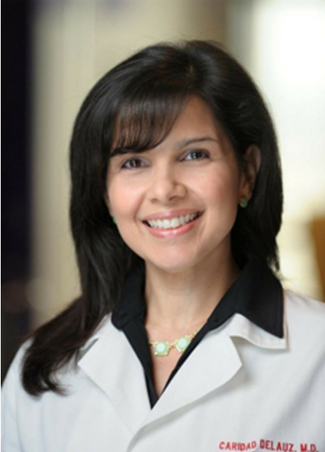Story of Caridad Maylin de la Uz M.D.

“I challenge every medical student and every young doctor to use each negative experience, each seemingly insurmountable defeat, to stoke a fire that will propel you towards your dream and not one that will consume you along the way. “
Caridad, Medical Physician, GEMS Class of 2005-2006
I am a 39 year-old Cuban-American who was blessed with the opportunity to leave my dirt road town in the outskirts of Havana during the 1980 Mariel Boatlift. A shrimp boat named “The Lorraine” delivered my family and I to the shores of boundless opportunity. President Carter, I am forever grateful! I was the first in my family to attend college and my dreams of becoming a doctor always appeared lofty to those who knew me as the child of a blue-collar immigrant family with limited resources. But I had a family that never built fences around my dreams, so I never realized that the rest of the world did not expect me to amount to much.
What made me go into medicine? Let me direct you back to that dirt road town in Cuba. I was 3 or 4 years old and, yes, I still remember it. There were 2 people who etched the need to be a physician into my very soul. First, Dr. Marqueti, one of our town’s two doctors. He frequently made house calls and we received him like a king. He would lay hands on me, scribble something on a piece of paper and, soon after, my grandfather would return from the pharmacy with some injection, or salve, or pill. And I would be healed…every time. No one else in my life seemed to be endued with these seemingly magical powers. Through the eyes of a child, what a mystifying presence he was!
The second person was a young boy, about 9 or 10 years old, with what I now recognize was some severe form of cerebral palsy. He didn’t move, he didn’t speak; he just laid there on a small metal hospital bed with his eyes wide open. He was pristinely dressed in pajamas and there was a Mayo stand covered in syringes, suction bulbs, medicine vials and clean towels sitting by his bed. When my family visited his house they would sit me next to him to watch a tiny black and white TV that he had in his room. To this day, I can remember the unnerving mix of fear, sadness, pity, and curiosity that overcame me every time. I had so many questions: why is he like this, why doesn’t he talk, why does he have to get so many needles? But it was impolite to ask, so I never did. I kept those experiences locked deep in my subconscious. Then, twenty-some years later, it came time to choose a specialty; I chose pediatrics.
After completing my undergraduate degree at Johns Hopkins University, I struggled to get into medical school for several years. I had lost all hope until I learned about the GEMS Program (Georgetown Experimental Medical Studies Program). In the GEMS program, under the faithful and unwavering mentorship of David L. Taylor, I was molded into a student worthy of the privilege of studying at Georgetown School of Medicine. Amid all these rich experiences, Georgetown Med School remains the single most formative experience of my career. Cura personalis is not just a motto, it is the very essence of Georgetown’s medical education. I cherish that I was taught to care for the whole person. Here, I learned how to treat the disease while respecting the religious beliefs, socioeconomic circumstances, and family situations from which the disease cannot be isolated. I am a Georgetown physician; I do not treat diseases, I treat people.
I would not be a doctor today if it were not for Dean Taylor. After graduating AOA with honors from Georgetown, I completed my pediatrics residency at Boston Children’s Hospital and then completed an additional 4 ½ years of fellowship in pediatric cardiology and electrophysiology at Baylor College of Medicine/Texas Children’s Hospital. Today I am blessed to be a pediatric cardiologist/electrophysiologist at Texas Children’s Hospital, the #2 ranked pediatric cardiac center in the US.
The road to becoming a physician is fraught with experiences and challenges that subtly over time shape the doctor you become. Like many of my minority colleagues in medicine, I encountered obstacles along the way in the form of biases and discrimination, both subtle and overt. Today, I am thankful for those experiences because they have taught me a great lesson. Standing up for one’s self and one’s cause does not always require a roaring outcry against an injustice. There are times when our cause is advanced by humbly putting our head down and allowing those who have judged us unfairly to believe that they are correct. All the while, we should remain convinced that our hard work, our achievements and our accolades will eventually speak for themselves, and they will do so loudly. I challenge every medical student and every young doctor to use each negative experience, each seemingly insurmountable defeat, to stoke a fire that will propel you towards your dream and not one that will consume you along the way. The embers of humiliation, in the presence of sparks of humility and perseverance, ignited within me a roaring fire of defiance. I defied people’s assumptions and their expectations because limited expectations are no match for the unlimited potential that dwells deep in each of us. As Ayn Rand said, “The question is not who is going to let me, it’s who is going to stop me.”
